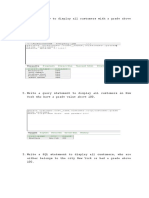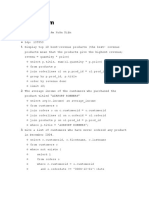0 ratings0% found this document useful (0 votes)
18 viewsOracle SQL Excercise 5 - Formatting Output
The document provides 10 SQL statements to query and summarize data from sample tables. The statements include:
1) Displaying salesman data with commission as a percentage.
2) Counting the number of orders per day and formatting the output.
3) Arranging orders by order number.
4) Arranging orders by order date with latest first.
5) Arranging orders by date and purchase amount.
6) Arranging customer data by customer ID.
Uploaded by
aditya infaCopyright
© © All Rights Reserved
Available Formats
Download as DOCX, PDF, TXT or read online on Scribd
0 ratings0% found this document useful (0 votes)
18 viewsOracle SQL Excercise 5 - Formatting Output
The document provides 10 SQL statements to query and summarize data from sample tables. The statements include:
1) Displaying salesman data with commission as a percentage.
2) Counting the number of orders per day and formatting the output.
3) Arranging orders by order number.
4) Arranging orders by order date with latest first.
5) Arranging orders by date and purchase amount.
6) Arranging customer data by customer ID.
Uploaded by
aditya infaCopyright
© © All Rights Reserved
Available Formats
Download as DOCX, PDF, TXT or read online on Scribd
You are on page 1/ 2
1.
Write a SQL statement to display the commission with the
percent sign ( % ) with salesman ID, name and city columns for
all the salesmen.
Sample table : salesman
SELECT salesman_id,name,city,commission,’%’, FROM salesman;
2. Write a SQL statement to find out the number of orders
booked for each day and display it in such a format like "For
2001-10-10 there are 15 orders".
Sample table : orders
SELECT ‘For ‘||ord_date as order_date, COUNT(DISTINCT ord_date)||’ orers’ as orders
FROM orders GROUP BY ord_date;
3. Write a query to display the orders according to the order
number arranged by ascending order.
Sample table : orders
SELECT * FROM orders ORDER BY ord_no;
4.Write a SQL statement to arrange the orders according to the
order date in such a manner that the latest date will come first
then previous dates.
Sample table : orders
SELECT * FROM orders ORDER BY ord_date desc;
5. Write a SQL statement to display the orders with all
information in such a manner that, the older order date will come
first and the highest purchase amount of same day will come
first.
Sample table : orders
SELECT * FROM orders ORDER BY ord_date ,purch_amt desc;
6. Write a SQL statement to display the customer name, city and
grade, etc. and the display will be arranged according to the
smallest customer ID.
Sample table : customer
SELECT name,city,grade FROM customer ORDER BY customer_id;
7. Write a SQL statement to make a report with salesman ID,
order date and highest purchase amount in such an arrangement
that, the smallest salesman ID will come first along with their
smallest order date.
Sample table : orders
SELECT salesman_id,ord_date,max(purch_amt) FROM orders GROUP BY
salesman_id,ord_date ORDER BY salesman_id,ord_date;
8. Write a SQL statement to display customer name, city and
grade in such a manner that, the customer holding highest grade
will comes first.
Sample table : customer
SELECT cust_name,city,grade FROM customer ORDER BY grade
desc;
9. Write a SQL statement make a report with customer ID in
such a manner that, the largest number of orders booked by the
customer will comes first along with their highest purchase
amount.
Sample table : orders
SELECT customer_id, count(distinct ord_no), max(purch_amt)
from orders group by customer_id ORDER BY count(distinct
ord_no) desc;
10. Write a SQL statement to make a report with order date in
such a manner that, the latest order date will comes first along
with the total purchase amount and total commission (15% for all
salesmen) for that date.
Sample table : orders
SELECT ord_date , SUM(purch_amt),SUM(purch_amt)*0.15 as commission FROM orders
GROUP BY ord_date ORDER BY ord_date;
You might also like
- Oracle SQL Excercise 4 - Aggregate FunctionsNo ratings yetOracle SQL Excercise 4 - Aggregate Functions4 pages
- Prashant Tripathi (Ajay Kumar Garg Engineering College) SQL AssignemntNo ratings yetPrashant Tripathi (Ajay Kumar Garg Engineering College) SQL Assignemnt8 pages
- Name Sanjay Kumar BATCH A (3,4) ID 2016UCP1382No ratings yetName Sanjay Kumar BATCH A (3,4) ID 2016UCP13825 pages
- Most frequently asked SQL interview questions with their answersNo ratings yetMost frequently asked SQL interview questions with their answers2 pages
- Write A Query To Display All Customers With A Grade Above 100No ratings yetWrite A Query To Display All Customers With A Grade Above 10010 pages
- Student Name: Abdulaziz Bakhsh Student ID: 1543123 Database Lab 4No ratings yetStudent Name: Abdulaziz Bakhsh Student ID: 1543123 Database Lab 46 pages
- Bank Management System Queries:: 1. Please Follow Instructions Given BelowNo ratings yetBank Management System Queries:: 1. Please Follow Instructions Given Below9 pages
- SQL Is A Standard Language For Accessing and Manipulating Databases. What Is SQL?No ratings yetSQL Is A Standard Language For Accessing and Manipulating Databases. What Is SQL?25 pages
- Assignment 05: List The Customers Who Live On Main Street (In Any City)No ratings yetAssignment 05: List The Customers Who Live On Main Street (In Any City)12 pages
- Synopsis: SHREE GAYATHRI OPTICALS KINATHUKADAVU. It Is Developed Using Visual BasicNo ratings yetSynopsis: SHREE GAYATHRI OPTICALS KINATHUKADAVU. It Is Developed Using Visual Basic11 pages
- Name: Morales, Arjay Christopher D. Assignment #: 6-2No ratings yetName: Morales, Arjay Christopher D. Assignment #: 6-24 pages
- Submission Example For Database Design AssignmentNo ratings yetSubmission Example For Database Design Assignment2 pages
- Create A Database Company Contains Tables Employee, Department, Dept - Locations, Project, Works - On, Dependent100% (1)Create A Database Company Contains Tables Employee, Department, Dept - Locations, Project, Works - On, Dependent8 pages
- EMC Documentum Reporting Services: Development GuideNo ratings yetEMC Documentum Reporting Services: Development Guide53 pages
- ETL Testing Interview Questions and Answers PDFNo ratings yetETL Testing Interview Questions and Answers PDF5 pages
- DBMS-21CSL55 Lab Manual With 3 Varients 2023-24No ratings yetDBMS-21CSL55 Lab Manual With 3 Varients 2023-2469 pages
- Useful Oracle Queries For SAP Basis Adminsitrators100% (1)Useful Oracle Queries For SAP Basis Adminsitrators15 pages
- Explore the role of SQL in the relational database by showing how it worksNo ratings yetExplore the role of SQL in the relational database by showing how it works4 pages

























































































